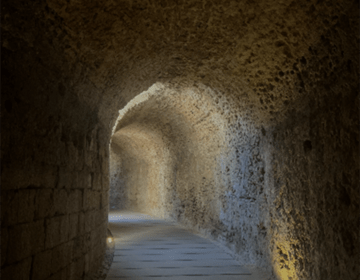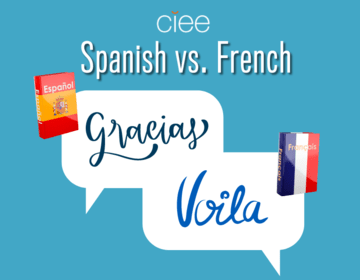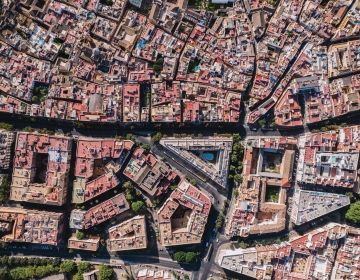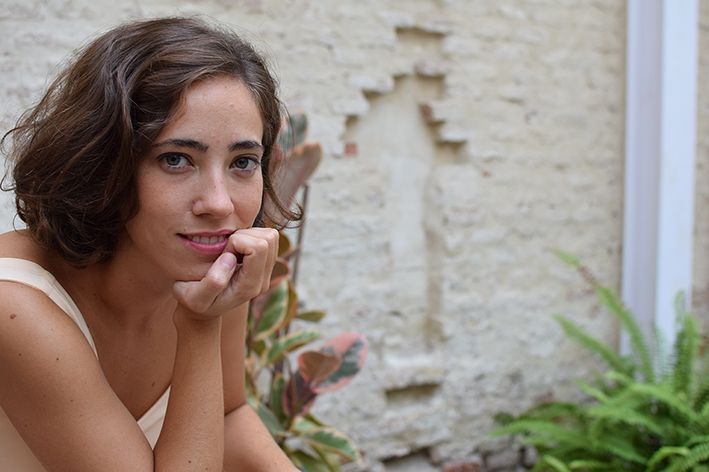Thoughts on Women of the Future: An Interview with Marina Blesa
Laura Place, student of the Communications, New Media and Journalism Spanish program, interviews her professor Marina Blesa.
Marina awaits the answers of her students with an ever-encouraging expression. She smiles with her whole face, and those in the class feel better knowing that the energetic woman in front of them is, simply, a good person. She is always up on her feet and changing her position, shifting her weight between her legs. She dresses practically, her clothes altered a bit for the daughter she is expecting. She wears her brown hair in a bun, more for sensibility than for fashion, allowing for a better view of her friendly face.
L: Is there a specific focus or passion that guides your work?
M: For me, the thing that connects my work is passion. I have worked in various types of media, and while I liked it, I wasn’t feel completely happy. One day, I had an experience with education and I felt passion. I had so much fun. I prefer to work with young people. I’m teaching, but at the same time I’m also learning. I’m never bored, and every day is different.
L: What is the power of telling stories?
M: Working in media, we are very lucky because we get to know people as they truly are. There isn’t an interesting or important story without its protagonist. This is the key, that someone who normally doesn’t have a way to make their voice heard, now can be heard thanks to an interview. Stories have power because they allow us to know people.
L: What does the voice in your head sound like – do you talk to yourself the way you talk to other people?
M: I always try to be fair and treat others the way I want to be treated. However, it’s also true that I am a person of contradictions. For example, I always say that I’m a feminist, but I was educated in a predetermined culture. I have certain behaviours where I have to say, “ah, that’s not feminist!” Therefore, I try every day to be a better person. I think I’m better with others than I am with myself (laughing). With my family and my students, I try to be a good person, but I’m more critical with myself. I’m a perfectionist, and always try to do my best. The contradictions I talk about are, for me, a way to reflect and better myself.
L: How have you seen the fight for women’s rights change in Spain over the years?
M: In Spain, we have experienced an incredible evolution of equality between men and women, and we can see it– we live better than our mothers and grandmothers. There is still a lot to do, but people are more conscious of the importance of equality, and because of this I think we’re on the right path.
L: How have you experienced the development of equality, specifically in your areas of work?
M: I haven’t necessarily seen it in the glass ceiling or in salary, because I am always able to work in what I want. But I have noticed it in the classroom, where there are more and more men who are conscious of it. The fight for equality for men and women cannot continue without men. For me personally, I recognize that I’ve been lucky, because I work with people who are conscious of this. But equality should not depend on luck, it should depend on justice.
L: How do you define feminism?
M: To me, feminism is the possibility of freedom for all people, not limited just to gender equality but freedom in all forms. Being feminist is not having labels. It’s the power to feel completely myself, and the power of all people to feel themselves.
L: Who embodies this definition for you?
M: A typical response, but it has to be my mom. She is a woman who is sure, strong and independent. At the same time, there are figures both historical and alive who I refer to – Simone De Beauvoir, Clara Campoamor, Judith Butler in the United States, and Paul B. Preciado, a philosopher and activist from Spain.
L: Describe being pregnant in three words.
M: Well, that’s a very beautiful question that no one has asked me. Expecting a baby alongside the person I love – oh, I’m going to cry! – has been one of the most beautiful things that could happen to me. On the topic of equality, I also know that I’m going to have a girl. It’s important to me to continue to fight to make that the world more just, because I know it’s her future.
L: You’ve mentioned that you are a very organized person – have you planned and studied similarly to prepare for having a baby?
M: (Laughing) Yes, absolutely. I’ve realized that there are two types of women, those who don’t want to know anything, and those who, once they are pregnant, want to know everything. As a journalist, I believe that information is power, that it makes me free. In this sense, just like with my work, I want to have control.
Laura Place, participant in the Communications, New Media and Journalism Program from Western Washington University, interviewed her professor Marina Blesa last April.
Related Posts

Exploring Cádiz, Ronda, and Córdoba
By: Rebecca Bollich Exploring the stunning cities of Cádiz, Ronda, and Córdoba on day trips with CIEE has been one of the highlights of my study abroad experience. These excursions... keep reading

Spanish vs. French: Which is Better?
If you’re choosing between learning French vs. Spanish language ahead of an upcoming study abroad adventure, first, excellent choice to consider learning a new language. Second, follow along with us... keep reading

Ring Ring! Seville is Calling!
Seville, located on the Guadalquivir River, is one of Spain's main cultural and tourist attractions. It also has many American students studying abroad here. In part because of its rich... keep reading
